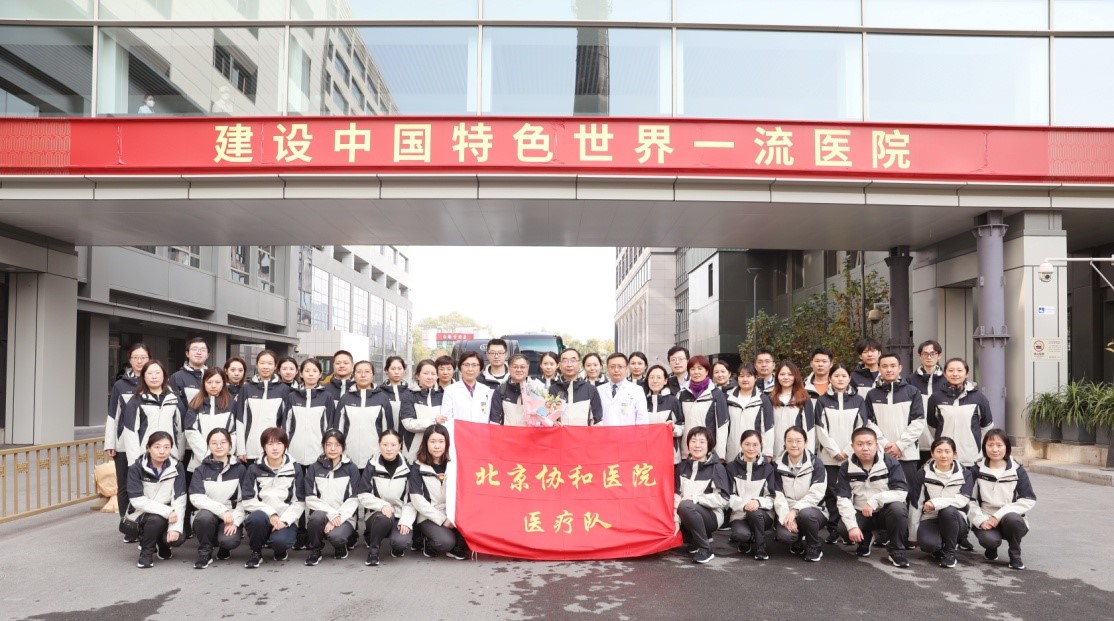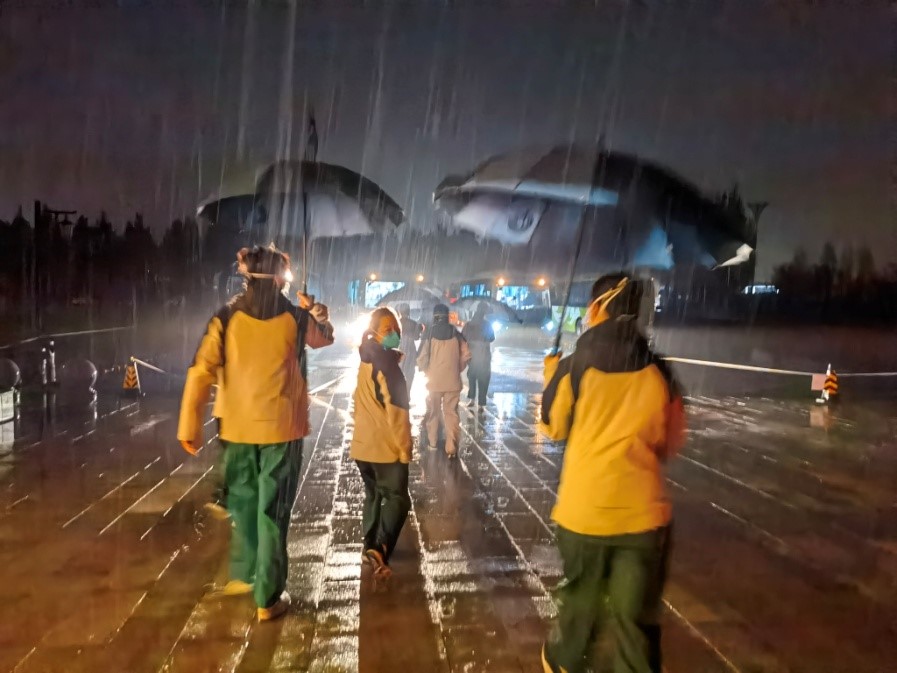On November 8, 2022, PUMCH, upon realizing the severity of the current wave of COVID infections in Beijing, managed to assemble a 46-strong medical team within 24 hours, which went to aid Xiaotangshan Makeshift Hospital in Beijing, specifically tasked with providing medical services to patients in Unit No. 8.
The head of the medical team is Li Mengtao, Deputy Director of the Department of Rheumatology, and the deputy heads are Xia Ying, head nurse of the Department of Medical ICU, and Zheng Ying, head nurse of the Palliative Care Center. The team includes veterans that aided Hubei shortly after the COVID-19 outbreak as well as younger members from the nucleic acid sample collection team. At the front line of the combat against COVID, with their outstanding clinical capabilities, great compassion for and firm commitment to patients, they have explored and adopted an approach with PUMCH characteristics that is a towering beacon of hope for patients in the makeshift hospital.
Put in Place Various Working Mechanisms
As one of the earliest teams to come to aid the Xiaotangshang Makeshift Hospital upon its reopening, the PUMCH medical team took over 144 beds, which received both domestic and imported cases, on the third floor of the newly opened Unit No. 8. Treating a large number of patients in a completely new working setting posed many challenges to the medical team at the onset.
After the handover and training, the first shift of medical staff, including the team leader Li Mengtao and deputy leader Xia Ying, started to work in the unit assigned to them. After briefly familiarizing themselves with the setting, the medical team immediately set out to improve the organizational structure, reasonably assign personnel and clarify their responsibilities. Besides clinical care, nosocomial infection and quality control are also top priorities, thus Xu Mei, Deputy Director of the Department of Infection Control, and Zheng Ying, deputy team leader were assigned to supervise and oversee the two matters respectively.
A well-designed system is the best way to sound management. Thus the medical team rapidly reviewed the workflow for continuous optimization. Through trial and error, they developed a work model with PUMCH characteristics and put in place systems for patient admission, scheduling and task assignment, handover, ward rounds and consultation, among others. The ultimate purpose is to treat every patient rigorously and efficiently.
According to the practical experience of the PUMCH team aiding Hubei after the outbreak in 2020, the medical team at Xiaotangshan Makeshift Hospital set up a core group, comprised of 12 members, including the team leader, deputy team leader, members of the command unit, head nurse and medical technicians. All the six members that aided Hubei were selected into the core group. A regular meeting mechanism was also put in place. A meeting is held every day at 7 p.m. to quickly establish consensus on all tasks.
Three members of the team were selected into the command unit of the makeshift hospital. Working closely with personnel from several other hospitals, they are responsible for the overall operation and dispatching of the makeshift hospital. Hou Xiaonan from the Information Technology Center explained: “The command unit functions as the General Office, the Department of Medical Affairs, Infection Control, Nursing, Central Support and Security all in one. We at the command unit often work until 1 or 2 a.m.”
Saving More Lives with Professional Competences
“With doctors from the Department of Pediatrics, Obstetrics and Gynecology, Endocrinology, Surgery, Ophthalmology, and Otolaryngology on our team, we can give full play to our multidisciplinary strengths and give patients specialized consultation and management in addition to the routine treatment for COVID infection,” said Li Mengtao, leader of the PUMCH medical team.
The makeshift hospital admitted a number of young children and pregnant patients. For example, when a child developed a rash that was suspected to be drug-related, pediatricians combed through common pediatric drugs in search of the cause. A woman who was 21 weeks pregnant with gestational hyperthyroidism was found during medical assessment to have decreased fetal movement; an endocrinologist and an obstetrician/ gynecologist attended to her conditions with great care and reported the case to the command unit. She was then promptly transferred to a specialty hospital.
Seeing this as an opportunity for improvement, the PUMCH medical team pored over domestic and foreign studies related to COVID infection during pregnancy and gave a lecture titled “essentials of management of COVID infection in pregnancy” to the whole hospital. They then took on the task of providing care to obstetric patients in other units of the makeshift hospital. Thanks to the joint efforts of all, many pregnant women were safely discharged.
A high proportion of patients in Xiaotangshan are mid-aged and elderly, who often have underlying conditions. Thus, Xiaotangshan established an emergency care unit, with the medical branch headed by Professor Wang Jinglan from the Department of Respiratory and Intensive Care and the nursing branch headed by head nurse Xia Ying. “We offer hospital-wide online training on nursing for emergency care every day, and 10 training sessions have been offered till now,” said Xia Ying. The PUMCH medical team also set up a resuscitation room on each floor in Unit No. 8, and equipped them with crash carts, defibrillators, cardiac event monitors and other devices to increase the odds of saving patients’ lives in emergencies.
Improving Services Innovatively
Since Unit 8 was put into operation, it admitted over 100 patients every day, hence the huge differences in clinical typing and CT values of nucleic acid testing between patients. Accordingly, the workload of having doctors give medical orders and collecting them is enormous, and there is the risk of omission as well. To address the issue, the team members designed a nucleic acid testing supporting system, which, via screening, can quickly and accurately identify patients who need to have their nucleic acids retested and patients whose testing results meet the discharge criteria, greatly improving work efficiency.
The PUMCH medical team also took on the task of managing imported cases. In the past month, nearly 30 foreign patients from more than 10 countries were admitted, most of whom could not communicate in Chinese. In light of this, the medical team translated and compiled the English version of “Tips for Admission”, “Tips for Mental Health”, “Admission Assessment Form”, “WeChat Account Registration Steps” and “Discharge Tips”.
Assuaging Patients’ Anxiety with Kindness
To assuage patients’ anxiety, the team members sorted out common issues and quickly compiled a set of educational materials covering various aspects such as medical care, living necessities, mental health, fire safety and communication channels. The health education materials were tailor-made for elderly people with diabetes and hypertension, greatly improving the doctor-patient communication efficiency and patient satisfaction.
The team members attended to patients with high-risk factors and special needs in a more considerate and thoughtful manner. For example, an elderly post-operative patient with advanced tumor and multiple metastases was not able to take care of himself and not accompanied by his family, but the meticulous care of nurses ensured his sound recovery and discharge. Unit No. 8 also admitted a number of post-operative patients. Given that the makeshift hospital only had limited equipment and facilities, the team members proactively asked around to bring in more equipment and gave instructions on surgical wound dressing change and rehabilitation to patients.
The team members applied the PUMCH philosophy of “treating patients like family” to all aspects of their work in the makeshift hospital. They respected patients’ folk customs and habits and satisfied their individual needs. They comforted and touched patients with their warm services. They won the unanimous recognition of patients, as evidenced by the many heartfelt letters of thanks from patients: “At first, I felt the makeshift hospital was so unfriendly and anxiety overwhelmed me. But your meticulous care in everything from health monitoring to living necessities assuaged my anxiety and made me feel warm in this cold winter”; “thank you for sticking to your post at the front line of the combat against COVID despite the health risks to you yourselves. You are compassionate COVID fighters in white that tower as a beacon of hope for us.”

On November 8, 2022, President Zhang Shuyang and Vice President Wu Peixin were seeing off the medical team to Xiaotangshan Makeshift Hospital

Team members heading towards shift takeover in rain
Written by: Wang Jing, Sun Yiying and Chen Jie
Picture courtesy: Sun Liang and Zhao Qian
Translator: Liu Haiyan
Editor: Wang Yao
